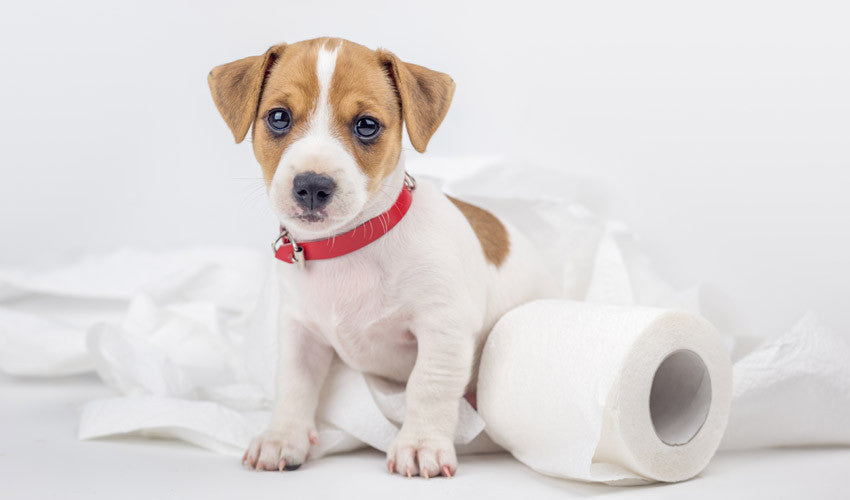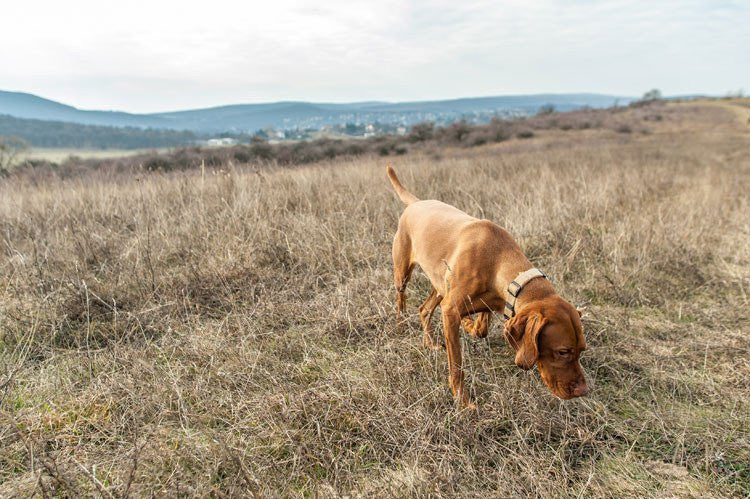
MY PUPPY HAS DIARRHEA: WHEN SHOULD I BE WORRIED?
If you've recently got a small dog or are planning to adopt one soon, you'll probably encounter a fairly common problem: puppy diarrhea.
However, even though this situation is quite common, that doesn't mean you shouldn't take it seriously. In fact, in some cases, dehydration due to untreated diarrhea can be dangerous, even fatal, for your little one. Diarrhea should never be taken lightly and should be a cause for concern, as a young dog's condition can deteriorate much more quickly than that of an older animal.
But when should you worry and how should you intervene?
CAUSES OF DIARRHEA IN PUPPIES
- Stress
Any change, even for the better, is stressful for an individual. And the younger he is, the more difficult it will be for him to handle new situations. However, a young puppy sees his environment completely changed in the space of a few days (sometimes even a few hours). He is assigned a new family that, although loving, is not his own. He is cut off from his mother and brothers and sisters. His living environment is new: the smells, the sounds, nothing is familiar to him. Add to that the fact that he has to travel in a car and you will understand that the stress is enormous for such a small individual. In addition, when he arrives in his new home, your little dog is the object of a lot of attention and is hugged by everyone. All of this can cause intestinal disturbances caused by stress.
Although it's hard to resist cuddling your little furball, it's highly recommended to give them some quiet time when they first arrive home to avoid overexcitement and stress. Remember to keep them supplied with fresh water and encourage them to drink often.
- Dietary changes
Your puppy has probably started on a solid diet at the shelter or with his foster family. You may have decided to introduce him to a new, higher-quality diet. However, any dietary change can cause digestive upset as the body has to adjust to the new diet. It's best not to make a sudden change and to introduce the new diet gradually over seven to ten days. Continue feeding your puppy his starter diet and gradually mix in the new diet.
- Ingestion of an inedible foreign body
Puppies are curious by nature, like all babies. They tend to put everything in their mouths. It's their way of discovering the world. However, certain foods, and of course certain toxic objects or products, can cause poisoning or block the trachea. Pay special attention to objects that could be dangerous for your puppy, as well as plants, flowers, medications, or foods that you consume that could be within his reach. The best thing to do is never leave your puppy alone unattended. If you have to leave the house, place your little friend in a closed room with his water and food. He will take the opportunity to rest.
- Intestinal worms and parasites
The puppy may have been born with worms (hookworms, roundworms, or tapeworms) or may have contracted them through their mother's milk. This is quite common. Some protozoan parasites such as coccidia and giardia can also cause diarrhea. Too small to be visible to the naked eye, unlike worms, they take the form of cysts or larvae and infest the intestines, causing very liquid and very odorous stools, often mixed with blood and/or mucus. Diarrhea will generally be accompanied by vomiting, loss of appetite, and extreme fatigue. Be vigilant! These parasites can be transmitted to other animals and humans, hence the importance of taking the necessary hygiene measures.
- Viral infections
Diarrhea is one of the most common symptoms of many viral infections, the most serious of which is Canine Parvovirus, commonly referred to as Parvo, a contagious and debilitating infection that is spread through infected feces and causes foul-smelling stools accompanied by blood, vomiting, lethargy, and dehydration. Parvo is relatively treatable in adult dogs, but can be fatal in puppies, so it is important to consult your veterinarian urgently.
- RELATED ARTICLE: 👉 How to manage diarrhea in animals?
DIARRHEA: SIGNS TO TAKE SERIOUSLY
If your puppy has diarrhea for more than 24 hours despite taking steps to stop it, or if the diarrhea is accompanied by the following symptoms, this is a sign that something is wrong. You should consult a veterinarian.
- Presence of blood in the stool
If you notice blood in your stool, seek medical attention. However, mild colon irritation can cause small, light blood streaks, which are harmless. However, if blood is clearly present, it's a sign to take seriously.
- Loss of appetite
If your puppy is barely eating or not eating at all, and has diarrhea, it means he's weakened. Since, as we'll see later, it's recommended to fast your puppy for 24 hours, make him drink. But if his appetite doesn't return after that, consult a doctor.
- Lethargy
Has your puppy stopped playing? Is he sleeping all the time? This isn't normal for a puppy, even if he needs a lot of sleep. Lethargic behavior is a sign of weakness that should be taken into account.
- Vomiting
If diarrhea is accompanied by vomiting, consult a doctor immediately.
- Temperature
Lethargy is often a sign of fever. Check your puppy's temperature, which should be between 37.5 and 38.7 degrees Celsius. If you don't have a thermometer but are concerned that your puppy may have a fever, it's best to seek medical help.
- Abdominal pain
Of course, it's difficult to know exactly how your puppy is feeling since they can't express themselves. However, a dog in pain will tend to lie down or even cry. If your puppy seems to be suffering from abdominal cramps in addition to their diarrhea, keep an eye on how their overall condition is changing.
HOMEMADE SOLUTIONS TO SUPPORT YOUR PUPPY WITH DIARRHEA
- Young
If your puppy has mild diarrhea but is playing and active and weighs more than five pounds, fast him for twelve hours, preferably overnight. Some veterinarians even recommend a 24-hour fast.
Your puppy may cry, and it won't be easy not to give in, but do it for their own good! The digestive tract can only heal when they're at rest. However, give them fresh water regularly to ensure they don't become dehydrated, which would be fatal at such a young age. Fasting is the first thing to do in case of intestinal upset, for both humans and animals. Ideally, if it's possible for you, try not to leave your little puppy alone for these 12 to 24 hours.
- Homeopathy
There are several homeopathic solutions that can gently treat diarrhea or loose stools. This way, you can rest assured that you're using a natural product. Don't hesitate to consult a qualified homeopath for advice on puppy diarrhea. They will know which product to recommend and may even offer a tailored formula based on your situation. Homeopaths focus on the individual and help each case uniquely.
- Natural herbal products
Certain natural plant-based products can help your pet recover from diarrhea. Slippery elm bark powder, for example, is particularly effective in cases of diarrhea. It soothes and protects mucous membranes and contains valuable nutrients.
We recommend seeking advice from a naturopath to ensure you are giving the right products. Never give herbal products to your pet without consulting a professional.
- Electrolyte solution
These solutions help prevent dehydration and replenish essential nutrients, just as we do with our babies when they have diarrhea. Consult your veterinarian to find out which solution to choose. A simple phone call may be all it takes.
- Intestinal dressing
This option shouldn't be your first choice. However, some breeders use intestinal bandages for chronic diarrhea in their dogs. It's always best to seek advice from your veterinarian, but here are some possible solutions:
Breeders often recommend using Kaopectate, which soothes the intestinal flora when simple fasting is not enough. This treatment, composed of kaolin and pectin, absorbs bacterial toxins and protects the intestinal mucosa, in addition to slowing digestive transit. Peptobismol can have the same effect. It is not recommended to use Immodium for dogs.
In any case, ask your veterinarian for advice before administering one of these intestinal dressings to be sure that it will be beneficial for your puppy.
THE VETERINARY CONSULTATION
If you have fasted your pet but their condition does not improve, or if their diarrhea is accompanied by blood and/or vomiting, consult your veterinarian immediately. Remember that a puppy becomes dehydrated much more quickly than an adult dog. Bring a stool sample to the veterinarian for analysis and always make sure your puppy is dewormed as soon as possible.
PREVENTIVE CARE
As the saying goes, "An ounce of prevention is worth a pound of cure." To avoid diarrhea, you can take preventative measures from your dog's earliest years. Healthy health habits are always the best protection.
- Probiotics
Available in homeopathic form,probiotics are live microorganisms that promote a healthy and balanced digestive system. If your pet is experiencing digestive issues (food intolerance, excessive gas, etc.), it may be a sign that they need probiotics. Additionally, you can administer probiotics regularly to help maintain healthy intestinal flora, regulate intestinal transit, and optimize their immune response.
- Adapted diet
The best defense is undoubtedly a healthy diet tailored to your puppy's needs. Commercially available kibble is rarely of good quality, which is why it's naturally less expensive. However, if you really want to give your puppy the best possible chance, consult your animal health specialist. They will be able to recommend a diet suited to your dog's breed, weight, and age.
_____________________
Puppy diarrhea is quite common, but it doesn't have to be! There are concrete steps you can take to prevent it, and if, unfortunately, despite your best efforts, it still occurs, you can really help your puppy recover quickly by taking the concrete steps mentioned in this article.
In any case, never hesitate to seek advice from a healthcare professional. They're the expert! And since a small dog is more fragile, it's best not to delay consulting a doctor if diarrhea lasts more than 24 hours.
Whatever happens, be vigilant and make sure to keep your little furball well hydrated and comforted. After all, they're just babies.























3 comments
Merci pour votre commentaire, Mme Peyvieux. Nous sommes heureux que vous avez aimé l’information!
Homeoanimo
Infos simple à comprendre et utiles merci
Peyvieux
bons conseils simple a comprendre .Merci
jean deghislage
Leave a comment
This site is protected by hCaptcha and the hCaptcha Privacy Policy and Terms of Service apply.